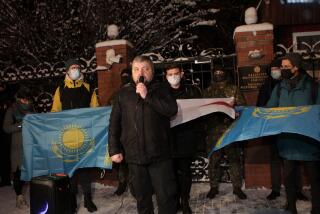Walesa Autobiography, ‘Way of Hope,’ Is Due in U.S.
- Share via
WASHINGTON — The story of a young Polish army corporal who rose to lead that country’s powerful Solidarity movement and win the 1983 Nobel Peace Prize will be told in the autobiography of Lech Walesa, to be published in the United States this fall by Henry Holt & Co.
Tentatively titled “A Way of Hope,” the manuscript was transported out of Poland and rushed into print in France early this month. It was published there by Fayard under the title “Le Chemin D’Espoir.” In New York, Holt general counsel Mal Rintoul would not comment on how the book had escaped the scrutiny of Polish censors, except to say that “To the best of our knowledge, the book was not published with the express permission of the Polish government.”
Explaining that Holt and Fayard had a “contractual” relationship that permitted the book’s publication in France and the United States, Rintoul added, “It’s pretty common knowledge that the Polish government certainly did not sanction this book.”
1984 Visit to Poland
A spokesman for Holt said the book had its origins in 1984, when Jack Macrae, editor-in-chief at Holt, visited Walesa in Poland and urged him to write his autobiography. Prominent in human rights publishing, Macrae also has been active in Helsinki Watch, the private organization established to monitor the Helsinki Accord, and the Assn. of American Publishers’ International Freedom to Publish suborganization.
During Macrae’s 1984 meetings with Walesa, an agreement was made and a writer began collaboration with the former shipyard electrician who headed the now-outlawed Solidarity independent trade union.
That writer, whose name has not been revealed, had delivered a portion of the manuscript before he was arrested in 1985. Walesa subsequently began working with a new team of writers who helped him complete “A Way of Hope.”
“We think it’s an important book by an important person,” Rintoul said. “Probably the less said about the book, the better. The important thing is to get it out and let it speak for itself.”
Forging an Alliance
Said Richard Seaver, president and publisher of Holt, “The publication of this book is important because it chronicles, from a unique perspective, not only the Polish government’s violent suppression of the Gdansk shipyard strike in 1970, but the forging of an alliance between workers, peasants and intellectuals that a decade later became Solidarity--a national movement claiming support from 70%of the Polish people.
“Lech Walesa,” Seaver continued, “remains a worldwide symbol, and indeed the reality, of nonviolent social revolution, despite constant and continuing repression from the government. He is an extraordinary man who can’t be silent.”
The book recounts Walesa’s days in the shipyards of Gdansk and his activities during the riots and strikes there in 1970. Key characters include Danuta, Walesa’s wife of 19 years, and the couple’s children, who, in the book, watch as their father is carted away by secret policemen.
Opposing Tyranny
In writing about Solidarity, Walesa describes how “the movement” took advantage of a new form of opposition to state tyranny based on the ancient values of Christian faith--values selected from the contemporary Catholic emphasis on human rights and social justice.
Serious disagreements with church leadership also are addressed in the book, as well as Solidarity’s occasional discords and absurdities.
In what is described as a “strong prose style,” Walesa stresses his allegiance to the small group of civil rights dissidents and publishers of underground literature who together formed the Committee for the Defense of Workers, Solidarity’s precursor.
With the imposition of martial law on Dec. 12, 1981, communications were cut internally and with the West, and as Walesa relates, “a miserable sense of abandonment closed in.”
The book’s existence was confirmed by Walesa late last month, but until last week there was no announcement of plans for an English-language edition of “A Way of Hope.” Other translations are to be published in Germany, Spain, Great Britain, Italy, Denmark, Sweden, Chile, Norway, Uruguay, Argentina, the Netherlands, Brazil, Paraguay and Turkey.
More to Read
Sign up for our Book Club newsletter
Get the latest news, events and more from the Los Angeles Times Book Club, and help us get L.A. reading and talking.
You may occasionally receive promotional content from the Los Angeles Times.










